

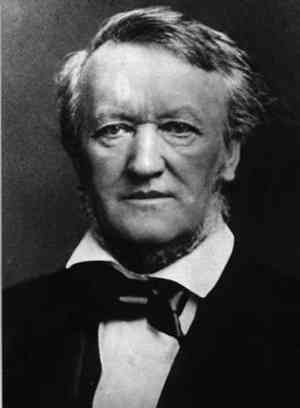
Richard Wagner
Source: Muse Worthy
Born on 22 May 1813 in Leipzig, Germany, at the House of the Red and White Lion, Wagner's oeuvre consists of 113 works, 27 of which were operas (ten left unperformed in his lifetime). He also wrote for orchestra, piano and songs. Wagner was the ninth child of a police clerk who died when he was six months old, so he was raised by actor, Ludwig Geyer, in relationship with his mother. While yet a child Richard played at least one minor role, an angel, in theatre. In 1828 he completed the tragic play, 'Leubald und Adelaide', alarming his parents with scenes of murder and rape. That same year he began instruction in harmony beneath Christian Müller, also writing a piano transcription of Beethoven's 'Symphony 9'.
In 1831 Richard transitioned to Leipzig University, also studying composition under Thomaskantor Weinlig. in 1832 his 'Symphony in C major' WWV 29 was performed in November by the student symphony of the Prague Conservatory before its premiere on 15 December in Leipzig followed by a second performance ten days later in Venice. The symphony wasn't Wagner's forte as was opera. This the only symphony which he completed, he would revise it 50 years later in 1882. "WWV" numbering is per the 'Wagner-Werk-Verzeichnis' of 1986 by John Deathridge, Martin Geck and Egon Voss.
'Symphony No.1' WWV 29 C major Richard Wagner
Premiere 15 Dec 1832 in Leipzig Revision premiere 25 Dec 1880 in Venice
Royal Scottish National Orchestra / Neeme Järvi
Wagner composed his first opera, 'Die Feen' ('The Fairies') WWV 32 in 1833, but it was never performed during his lifetime. The libretto was by Wagner who is distinguished from most other opera composers by writing his own texts. He also authored his second opera, 'Das Liebesverbot' ('The Ban on Love'), which saw stage on 29 March 1836 in Magdeburg. 'Das Liebesverbot' concerns a contest between the gloom of a puritan morality and more reasonable romantic love.
Overture to 'Die Feen' WWV 32 First opera by Richard Wagner 1833
'The Fairies'
Premiere 29 June 1888 in Munich
Libretto: Wagner
Symphonieorchester des Bayerischen Rundfunks / Wolfgang Sawallisch
'Das Liebesverbot' WWV 38 Comic opera by Richard Wagner
'The Ban On Love'
1834 Premiere 1836
Libretto: Wagner after Shakespeare's 'Measure for Measure'
Chor der Oper Frankfurt / Frankfurter Opern und Museumsorchester Sebastian Weigle
Richard married on 24 November 1836, one Minna, an actress who would leave him for another man the next year even though they remained married for nearly thirty years until her death in 1866.
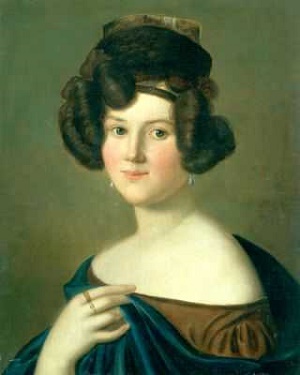
Minna Wagner
Painting by Alexander von Otterstedt 1835
Source: Wikipedia
Wagner left for Riga, Russia (now Latvia), yet a hinterland compared to Germany or Prague in 1837. He there became an opera director while employing the talents of Minna's sister, a vocalist named Amelia. He was back with Minna in Riga (now in Latvia) in 1838 where the pair assumed debts, then fled to London the same year. They were in Paris in 1839 where Wagner wrote articles and arranged operas for other composers. Wagner may have met the poet, Heinrich Heine, who was a friend of Marx, in 1839 if not during his next couple years in Paris.
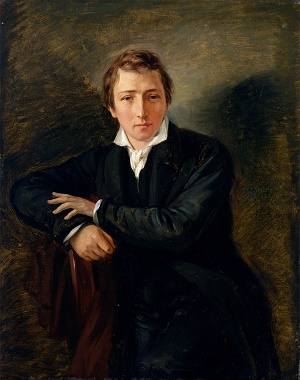
Heinrich Heine
Painting by Moritz Daniel Oppenheim 1831
Source: Wikipedia
Wagner would dip into Heine on multiple occasions, beginning with 'Les deux grenadiers' in 1840 borrowed from a French translation of Heine's 1822 'Die Grenadier'. This is the story of two grenadiers in Napoleon's army finally returning to France after being held prisoners in Russia, only to learn that Napoleon has been defeated. Wagner also consulted Heine's 1833 version of the Flying Dutchman toward his own 1843 opera. He further consulted Heine's 1837 "Elementargeister" ('Elemental spirits') toward 'Tannhaeuser' in 1845.
'Les Deux Grenadiers' WWV 60 Song by Richard Wagner
Published 1840
Libretto: Heinrich Heine
Piano: Geoffrey Parsons Baritone: Thomas Hampson
Wagner had been at work on 'Rienzi' prior to leaving for London. Completed in November of 1840, it premiered on 20 October 1842 in Dresden. 'Riensi' is a tale of the 14th century Roman, Cola di Rienzi, who along with his sister, Irene, and her lover, Adriano, rise up for the people against the noble Colonna and Orsini families, only to die by fire.
Overture to 'Rienzi' WWV 49 Opera by Richard Wagner
Premiere 20 Oct 1842 in Dresden
Libretto: Wagner after Edward Bulwer-Lytton's 'Cola di Rienzi'
Staatskapelle Dresden / Giuseppe Sinopoli
NPR Wikipedia
'Der fliegende Holländer' ('The Flying Dutchman') was completed in November 1841 to premiere in Dresden on 2 January 1843. This rendering of the tale of the ghost ship, the Flying Dutchman, was taken from Heine's 1833 'The Memoirs of Mister von Schnabelewopski'. The captain of the Flying Dutchman is cursed to wander the seas forever due to having summoned Satan. Allowed to shore once every seven years, in this version he is saved by the fidelity of a new lover, Senta, with whom he ascends to heaven. Texts for some of the works herein are found under Libretti below.
Overture to 'Der Fliegende Holländer' WWV 63 Opera by Richard Wagner
'The Flying Dutchman'
Premiere 2 Jan 1843 in Dresden conducted by Wagner
Libretto: Wagner
Frankfurt Radio Symphony / Marek Janowski 17 Nov 2017
Maureen Buja IMSLP Kennedy Center
Der Meister Score Wagner Operas Wikipedia
'Das Liebesmahl der Apostel' ('The Love-Meal of the Apostles' or 'The Feast of Pentecost') WWV 69 was a folkloric miracle play performed on 6 July 1843 in the city of Dresden which commissioned it.
'Das Liebesmahl der Apostel' WWV 69 Miracle play by Richard Wagner
'The Love-Meal of the Apostles' or 'The Feast of Pentecost'
Premiere 6 July 1843 in Dresden
Chorus: Wagner
Ambrosian Male Voice Chorus / Symphonica of London / Wyn Morris
IMSLP Wikipedia
'Tannhäuser und der Sängerkrieg auf Wartburg' ('Tannhäuser and the Singers' Contest at Wartburg') arrived to Dresden on 19 October 1845. As mentioned, Wagner drew from Heine's 1837 'Elementargeister' to write 'Tannhaeuser'. Tannhaeuser is a minstrel knight for whose soul is a competition between Venus and the Virgin Mary, which the latter wins upon the sacrifice of one Elisabeth with whom Tannhaeuser also dies, together heaven bound.
Overture to 'Tannhäuser und der Sängerkrieg auf Wartburg' WWV 70
'Tannhäuser and the Singers' Contest at Wartburg'
Opera by Richard Wagner
Premiere 19 Oct 1845 in Dresden
Libretto: Wagner
Berliner Philharmoniker / Herbert von Karajan
Werner Hintze IMSLP Nederlandse Richard Wagner Website
Score Wagner Operas Wikipedia English Wikipedia German
Influenced by Mikhail Bakunin, Wagner is the first socialist composer to enter these histories. In 1849 he was among the revolutionaries during the May Uprising in Dresden, thus fled to Paris, then Zurich where in the latter part of the year he wrote his essays, 'Die Kunst und die Revolution' ('Art and Revolution') and 'Das Kunstwerk der Zukunft' ('Art-Work of the Future') in which he pronounced the symphony brought to its ultimate expression by Beethoven, thus calling for something beyond which he identified, in so many words, as drama for the folk.
Before continuing further we should touch upon the subject of the Holy Grail, as Wagner addresses similar matter in a couple of his operas, namely 'Lohengrin' in 1850 and 'Parsifal' thirty years later in 1880. The Holy Grail is said to be the chalice from which Jesus drank at the Last Supper. This relic goes with the Holy Spear of Longinus, the Roman soldier who pierced Jesus in the ribs during his crucifixion to see if he was still alive. By analogy a holy grail is a goal difficult to achieve. Legend has the Holy Grail protected by knights of two sorts. The earliest would have been several centuries before the Crusades in the Arthurian Knights of the Round Table in Wales of which Perceval was one. The later would have been the crusading Knights Templar who guarded the Holy Grail at a castle built by Titurel in the Pyrenees called Montsalvat. Wagner's later 'Parsifal' is in reference to the Perceval of the Round Table as told by Chrétien de Troyes in France between 1182 and 1190 in a poem of about 9000 lines. He was also likely familiar with Wolfram von Eschenbach's German 'Parzival' which had been written not much later in the early 13th century.
As Wagner was in exile, Franz Liszt, whom he had yet to meet, conducted his 'Lohengrin' for him in Weimar on 28 August 1850. 'Lohengrin' contains Wagner's famous 'Bridal Suite' (also called 'Here Comes the Bride' or 'Wedding March'). Set in Antwerp during the tenth century, Lohengrin is the tale of one innocent Elsa who has been accused of killing her brother, Gottfried. Coming to her aid is Lohengrin, a Knight of the Holy Grail at Monsalvat whose father is King Parsifal. He agrees to serve Elsa so long as she doesn't ask his identity or from where he came. In a contest by God, Lohengrin fights Elsa's accuser, the Count of Telramund, and wins, but lets Telramund live since he is deceived by his wife, Ortrud, a witch who had falsely blamed Elsa from the start. Elsa and the mysterious knight marry, but the contest is declared void since Lohengrin won't reveal his name. Unfortunately, Telramund then attacks Lohengrin, but is killed, establishing Elsa's innocence once again by contest of God. Lohengrin then reveals who he is before returning to Monsalvat. His boat is led away as it had arrived, pulled by a swan which is revealed to be Gottfried, changed into a swan by the magic of Ortrud. Elsa dies in the end from the confusing anguish of it all. Wagner's original score for 'Lohengrin' is apparently worth 3.6 million dollars.
'Bridal Chorus' from 'Lohengrin' WWV 75 Opera by Richard Wagner
Premiere 28 Aug 1850 in Dresden conducted by Franz Liszt
Libretto: Wagner
Pennsbury Community Chorus / James D. Moyer
IMSLP Der Meister Nederlandse Richard Wagner Website
In September of 1850 Wagner pseudonymously published his anti-Semitic essay titled 'Das Judenthum in der Musik' ('Judaism in Music') in which he explained the wrong direction that Jews were leading culture. Including Mendelssohn who had died in 1847 and Meyerbeer who would die in 1864 as examples of the shallow, Wagner would issue another edition with his name on it in 1869.
Wagner explored what he thought to be a good opera in 'Opera and Drama' published in 1851. In 1853 he met Franz Liszt in Weimar who promoted his music and managed to sew an agreeable relationship between Wagner and his French rival, Hector Berlioz, whom he met in London in 1855 where they were both conducting. In 1862 Wagner moved to Biebrich, Prussia, then struck oil when Ludwig II [Wikipedia] of Bavaria invited him to Munich in 1864.
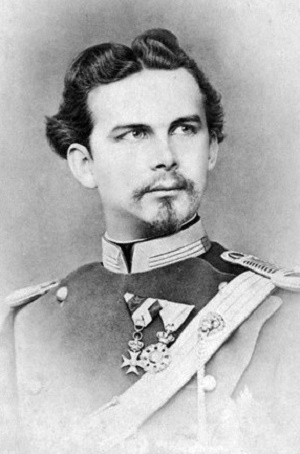
Ludwig II of Bavaria 1874
Source: Wikipedia
Ludwig II so appreciated 'Tristan and Isolde' in 1865 that he settled Wagner's debts, by then enormous. The libretto begun in 1857, the score in 1859, that premiered in Munich on 10 June. 'Tristan and Isolde' is considered one of the greatest operas ever written. Inspired by Gottfried von Strassburg's 'Tristan and Iseult' of the 12th century, Wagner weaves an intrigue between Marke, King of Cornwall, to whom Irish Isolde is promised to marry. Unfortunately, she is in love with Marke's adopted heir, the Breton, Tristan. Though 'Tristan and Isolde' is musically distinguished, one other element which raises this drama in the estimation of many is Wagner's delve into metaphysics along its path, for he employs not only Christian, Buddhist and Vedantic notions, but philosophy a la the pessimist, Arthur Schopenhauer (1788-1860 / Monsalvat / Wikipedia). Though Wagner and Schopenhauer were contemporaries the two never met.
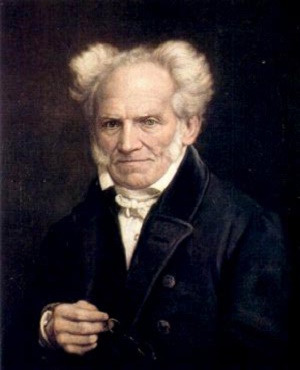
Arthur Schopenhauer
Painting by Jules Lunteschütz 1855
Source: Wikipedia
'Tristan und Isolde' WWV 90 Opera by Richard Wagner
Premiere 10 June 1865 at the National Theatre in Munich
Libretto: Wagner
Tristan: Ian Storey Isolde: Waltraud Meier
Teatro alla Scala C & O / Daniel Barenboim Milan 2007
IMSLP Der Meister Nederlandse Richard Wagner Website Opera Online
RWVI Hugo Shirley Wagner Operas Wikipedia
In 1866 Wagner's off and on marriage to Minna ended with her death by heart attack on 25 January. Wagner's comedy, 'Die Meistersinger von Nürnberg', later premiered on 21 June 1868 in Munich, another work influenced by Schopenhauer. 'Die Meistersinger von Nürnberg' concerns the romance between Eva, daughter of a wealthy goldsmith and mastersinger, Veit Pogner, and Walther von Stolzing, a German knight. The trouble is that Walther must learn to sing better, for Pogner will give his daughter to only the winner of a singing contest. This Walther does with help from the cobbler and mastersinger, Hans Sachs. The main antagonist in this story is Sixtus Beckmesser, town clerk and mastersinger who it is assumed will win the contest. Some believe that Beckmesser represents the Jew in a tale meant to be anti-Semitic.
'Die Meistersinger von Nürnberg' WWV 96 Opera by Richard Wagner
Premiere 21 June 1868 at the National Theatre in Munich
Libretto: Wagner
Koor van De Nederlandse Opera Nederlands Philharmonisch Orkest Marc Albrecht
Amsterdam June 2013
Calvin Dotsey IMSLP Der Meister Nederlandse Richard Wagner Website
The first of Wagner's four operas from 'Der Ring des Nibelungen' with its themes based in Norse mythology premiered in Munich on 22 September 1869 [see Nibelungen]. That was 'Das Rheingold' which libretto he'd begun to write back in 1852, the score in 1854. The entire 'Ring' cycle of four operas require about fifteen hours to stage. Though any of the four may be understood independently of the others, Wagner intended them as a sequence. In 'Das Rhinegold' the said ring, which to possess is to dominate the world, is fashioned by the dwarf, Alberich, who has stolen the gold for it from the bottom of the Rhine where three Rhinemaidens have rejected his advances. For the gold to have power its owner must renounce love, concerning which Alberich has no problem, despised as he is by the Rhinemaidens. He then enslaves the Nibelungens, able as he is with magical powers. As it transpires, however, the god, Wotan (Odin), then takes the ring in order to pay the giants who built Valhalla for him. But Alberich has cursed the ring such that it yields not only power, but doom to who would own it.
'Das Rheingold' WWV 86A 1st of 'The Ring' cycle Opera by Richard Wagner
Premiere 22 Sep 1869 at the National Theatre in Munich
Libretto: Wagner Dedicated to King Ludwig II of Bavaria
Orchester der Wiener Staatsoper / Buhnenorchester der Wiener Staatsoper / Ádám Fischer
Vienna State Opera 2016
IMSLP Der Meister Nederlandse Richard Wagner Website
Wagner's second in the 'Ring' cycle, 'Die Walküre' ('The Valkyries' / Wikipedia), premiered in Munich on 26 June 1870. He'd likewise been working on that much earlier, the libretto in 1852, the score in 1856. 'Die Walküre' opens where 'Das Rheingold' ends, with the ring in the possession of the dragon, Fafnir, who had killed the giant, Fasolt, to acquire it from Wotan. Much time has passed since then, however, for now Wotan has fathered the Valkyries, a group of daughters who guide the souls of the dead to his castle, Valhalla. He has also fathered the twins, Sieglinde and Siegmund, a daughter and son neither of whom knows that the other exists until they discover such in Scene III of Act 2 whence their relationship becomes incestuous. Though Wotan hopes that Siegmund might be able to reacquire the ring from Fafnir for him, incest contradicts family values more ideal such that he ends up helping Hunding, Sieglinde's husband, kill his son, then kills Hunding. Be as may, Sieglinde, is now pregnant with Siegmund's child whom she is instructed to name Siegfried by her protector, Brünnhilde, principle of the Valkyries. And now it is Brünnhilde who becomes subject to Wotan's sense of justice, condemning her to death for assisting Sieglinde even as Sieglinde's safety, as he now realizes, is his very intent, having lost a son, a son-in-law and a daughter in a conflict over family determination.
'Die Walküre' WWV 86B 2nd of 'The Ring' cycle Opera by Richard Wagner
Premiere 26 June 1870 at the National Theatre in Munich
Libretto: Wagner
Orchester der Wiener Staatsoper / Buhnenorchester der Wiener Staatsoper / Ádám Fischer
Vienna State Opera 2016
IMSLP Der Meister Nederlandse Richard Wagner Website
'Siegfried', the third work in Wagner's 'Ring' cycle, didn't show up until 16 August 1876 in Bayreuth although he had been at work on the libretto as early as 1851 to which he applied a score two decades later in 1871. In 'Siegfried' enough time has passed since 'Die Walküre' that Sieglinde has died in childbirth, leaving Siegfried to be raised by the dwarf, Mime, who is brother to Alberich who originally fashioned the ring whish is yet in the possession of the dragon, Fafnir. It is hoped that Siegfried will be able to regain it. As has been established in 'Die Walküre', the only one who can defeat Fafnir is one who has no fear while armed with the sword, Nothung, which had been broken. As it turns out, not only is Siegfied this fearless one, but he reforges Nothung, kills Fafnir and gains the ring. In the meantime Mime has plotted to acquire the ring by poisoning Siegfried who is innocent of knowledge in the powers of the ring until he learns that he is able to read Mime's mind and must kill him instead. Siegfried then learns from a bird singing of a woman sleeping on a rock inside a magic ring of fire. Such is how Wotan left his daughter, Brünnhilde, at the end of 'Die Walküre'. Albeit absence of fear is what prevents the ring from harming Siegfried, he wonders if he can learn fear from her. Come Wotan in disguise as a wanderer who now accepts the supremacy of his human grandson over his own divine self. Siegfried then passes through the fire which protects Brünnhilde and kisses her. She awakens from the sleep (death) into which Wotan had cast her and the pair fall in love, Brünnhilde to such degree that she renounces her own divinity in preference for love.
'Siegfried' WWV 86C 3rd of 'The Ring' cycle Opera by Richard Wagner
Premiere 16 Aug 1876 in Bayreuth
Libretto: Wagner
Orchester der Wiener Staatsoper / Buhnenorchester der Wiener Staatsoper / Ádám Fischer
Vienna State Opera 2016
IMSLP Der Meister Nederlandse Richard Wagner Website
'Götterdämmerung' ('Twilight of the Gods'), fourth and final work in his 'Ring Cycle', was performed on 17 August 1876 in Bayreuth only one day after 'Siegfried' premiered. Wagner had been at work on the libretto to that as early as 1848, the score not following until 1874. 'Götterdämmerung' opens with Brünnhild, having renounced her divinity, and Siegfried yet in love, proven in that Siegfried relinquishes the ring to her as pledge of it. And yet events transpire which find Brünnhild and Siegfried not only separated but betrothed to others, Brünnhild to marry Siegfried's recent blood brother, Gunther, and Siegfried to Gunther's sister, Gutrune. But that can't last as it is confusingly determined that Siegfried must die for betrayal of both Gunther and Brünnhild. Having retaken the ring from Brünnhild, Siegfried now dies of a spear delivered to his back by Gunther's chief minister, Hagen. Brünnhild reacquires the ring from Siegfried's hand, then bequeaths it back to the Rhinemaidens, from whom its gold had originally come, before riding her horse, Grane, into Siegfied's funeral pyre, to join him in death. Hagen attempts to steal the ring from the Rhinemaidens but they drown him. The tale ends with Valhalla going up in flames with its resident gods including Wotan, there no power so great as love.
'Götterdämmerung' WWV 86D 4th of 'The Ring' cycle Opera by Richard Wagner
'Twilight of the Gods'
Premiere 17 Aug 1876 in Bayreuth
Libretto: Wagner
Orchester der Wiener Staatsoper / Buhnenorchester der Wiener Staatsoper / Ádám Fischer
Vienna State Opera 2016
IMSLP Der Meister Nederlandse Richard Wagner Website
We here back up several years to August 25, 1870, when Wagner wedded Liszt's daughter, Cosima, in Lucerne.
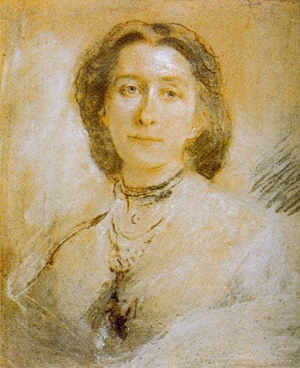
Cosima Wagner
Painting by Franz von Lenbach 1879
Source: Wikipedia
Cosima had helped Wagner write his autobiography, 'Mein Leben' ('My Life'), which he'd begun dictating to her on 17 July of 1865. It was 1870 when Wagner published the first of four volumes which he had begun upon request by Ludwig II in 1865. Wagner also designed a family coat of arms for this work. Volume 2 arrived in 1872, volume 3 in 1874, volume 4 in 1880. Wagner's autobiography accounted for the years 1813 to 1864, and a young Friedrich Nietzsche helped him proofread it.
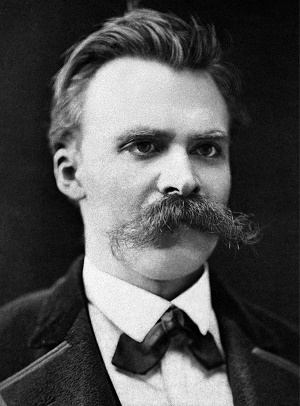
Friedrich Nietzsche
Photograph by Friedrich Hermann Hartmann C 1875
Source: Wikipedia
In 1871 Wagner and Cosima moved to Bayreuth where he published 'The Destiny of Opera' that year. In 1872 Nietzsche dedicated his 'The Birth of Tragedy' to Wagner. Nietzsche also praised Wagner in his 1874 essay, 'Wagner at Bayreuth' in 'Untimely Meditations'. Young Nietzsche had first met Wagner in 1868 and lived with him as well as Cosima at times. During this period Nietzsche thought that Germany didn't deserve Wagner, that France would be a home more worthy. In later years following Wagner's death Nietzsche would amend his opinions of Wagner in a couple of critical publications. In the meantime, however, Wagner's Festival Theatre was completed in 1875. It is here where Cosima established the Bayreuth Festival in 1912, very much a German nationalist event which surrounded itself around Cosima in what was the Bayreuth Circle. In the latter twenties the Bayreuth Festival attracted fans of Hitler by whom Wagner got appropriated into Nazism shortly after Cosima's death in 1930.
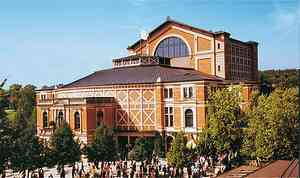
Wagner's Festival Theatre built 1875
Source: Opera News
A firm German nationalist, Wagner completed 'What Is German?' in 1878, begun in 1865 before the forming of Imperial Germany from out of Prussia and the North German Confederation in 1871, the latter arising out of the Confederation of 1815 in 1867.
Wagner's final opera was 'Parsifal' WWV 111. Though he had begun work on it in April of 1857 he didn't premiere its Prelude for Ludwig II in Munich until 1880. The whole thing was conducted by Hermann Levi on 26 July in Bayreuth. As mentioned, Wagner's libretto drew from both Christian de Troyes' 'Perceval' and Wolfram von Eschenbach's 'Parzival' written in the latter 12th and early 13th centuries. Wagner's story opens with King Amfortas wounded by the relic, the Holy Spear of the Roman soldier, Longinus, who had stabbed Jesus in the ribs during his crucifixion to see if he was yet alive. Amfortas was guardian of the Holy Grail and Spear, but the latter was stolen by the unclean knight, Klingsor. Amfortus had lost the Holy Spear due impure sin. Klingsor, himself, had attempted purity via castration, but it made him evil instead. Not even the pagan witch, Kundry, can heal Amfortus' wound. Parsifal at an age yet innocent arrives on scene, but no one connects him with the prophecy of a coming redeemer who is a pure fool. He is considered but a fool, for he has killed a swan which is viewed as an act unholy. In Scene 2 of Act 1 Amfortus painfully uncovers the Holy Grail, which radiant revelation brings not only bread and wine, but immortality to the knights of the Grail. Parsifal is asked what he has seen but he can't explain and is banished from the realm, having murdered a swan. In Act 2 Parsifal undergoes the temptations of flowermaidens in a garden who regard him for a fool when they don't succeed. Kundry then tempts him but does no better. Angry, she asks her master, Klingsor, to avenge her. Klingsor throws the Holy Spear at Parsifal, attempting to kill him. But Parsifal catches it, makes a sign of the Cross, and the garden withers together with Klingsor. When Act 3 opens it is many years later but Parsifal is yet armed with the Holy Spear. At the Castle of the Grail it is Titurel's funeral, he the builder of the castle and its original resident knight. Amfortus' wound is yet unhealed until Parsifal touches it with the Holy Spear. Parsifal then assumes Amfortus' office as keeper of the Grail which he then unveils to never again be covered. Amidst the bright radiance a dove hovers above Parsifal's head as Kundry dies, now released from her curse to never know the peace of redemption for having once laughed at the pain of the Redeemer.
'Parsival' WWV 111 Opera by Richard Wagner
Premiere 26 July 1880 in Bayreuth
Libretto: Wagner
Chor und Orchester der Bayreuther Festspiele
Wilhelm Pitz / Hans Knappertsbusch
Bayreuth Festival 1962
IMSLP Robert A. Johnson Andrew May Der Meister Metropolitan Opera
Monsalvat Nederlandse Richard Wagner Website
New York University RWVI Wagner Operas Wikipedia
The last work in the 'Wagner Werk-Verzeichnis' is the Christmas song, 'Ihr Kinder, geschwinde, geschwinde' ('You Children, Quickly, Quickly') WWV 113 completed in 1880. In early 1883 Wagner traveled to Venice to finish out winter, but he died of heart attack instead on 13 February. Buried in Bayreuth, his Bayreuth Festival has been an annual event ever since. Concerts in Israel, though, albeit attempted, remain in boycott there [BBC News]. In 1888 Nietzsche, who hadn't seen Wagner since 1876, qualified his earlier enthusiasm toward him in an essay titled 'The Case of Wagner: A Musician's Problem' [Wikipedia]. He followed that in 1889 with 'Nietzsche contra Wagner: Out of the Files of a Psychologist'. Among Nietzsche's criticisms of Wagner was his anti-Semitism. He also thought that for someone who wasn't Christian he was too Christian, although he agreed with Wagner's monogamist ideal. Nietzsche otherwise described himself as "antipodal" to both Wagner and Schopenhauer, the latter in whom Wagner, as mentioned, had found much agreeable.
Sources & References for Richard Wagner:
(All Music)VF History (notes)
Wagner Operas:
Part 1 (The Early Years 1813 - 1839)
Part 2 (Towards a New Musical Language 1839 - 1845)
Part 3 (Revolutions 1845 - 1865)
Part 4 (From Bayreuth to Venice 1875 - 1883)
Associates / Friends:
Hector Berlioz (composer / 1803-1869)
Heinrich Heine (poet / 1797-1856)
Friedrich Nietzsche (philosopher / 1844-1900):
Joseph Pearce (Richard Wagner and the Seduction of Nietzsche / 2020)
Jacqueline Scott (Nietzsche's Portraiture: Wagner as Worthy Opponent / University of Memphis)
Emrys Westacott (Why Did Nietzsche Break With Wagner? / 2019)
Audio of Wagner:
UCSB (cylinder recordings 1890-1925) WagnerOpera
Bayreuth Circle: Wikipedia English Wikipedia Spanish
Bayreuth Festival:
Bayreuther Festspiele
(history)
Kulturvollzug
(Musterknaben der Verfolgungsmaschinerie [Model
Boys of the Persecution Machine])
RWVI
(Richard-Wagner-Verband International)
Chronologies:
Collections:
Zentralbibliothek Zürich
Compositions / Works: Corpora:
Correspondence:
Gutenberg
(w Franz Liszt)
MDZ
Wikipedia German
Music:
Classic Cat (WWV)
IMSLP (alphabetical / chronological / genre / WWV)
Klassika (alphabetical)
Klassika (chronological)
Klassika (by genre)
Klassika (main)
Klassika (WWV)
Opera Folio (operas)
Stanford University (operas)
Wagner Opera (Bayreuth canon)
Wagner Operas (operas)
Wagner Web (WWV)
Wikipedia English (Bayreuth canon)
Wikipedia English (genre / WWV)
Wikipedia English (operas)
Wikipedia Esperanto (genre / WWV)
Wikipedia French (operas)
Wikipedia German (genre / WWV)
Wikipedia Norwegian (genre / WWV)
Wikipedia Serbian (WWV)
Wikipedia Swedish
(WWV)
Prose:
Gutenberg
IMSLP
Wikipedia
French
Compositions / Works: Individual: Chronological:
Die Kunst und die Revolution (Art and Revolution / 1842):
Autobiographische Skizze (Autobiographic
Sketch / 1843)
Das Kunstwerk der Zukunft (Art-Work of the Future / 1849):
Dr. Michael Pratt
Wikipedia Spanish
Das Judenthum in der Musik (Judaism in Music / 1850):
Oper und Drama (Opera
and Drama / 1851):
Der Ring des Nibelungen (cycle of four operas / 1869-76):
Nederlandse Richard Wagner Website
Wikipedia English
(analysis of the music)
Wikipedia English (analysis
of the text)
The Destiny of Opera (1871)
Mein Leben (My Life / autobiography / 4 volumes 1870-1880):
Full text
Full text
Wikipedia English
What Is German? (1878)
Controversies
(anti-Semitism / Aryan-Germanic racism / Nazi appropriation):
Ruben Amon
(The Wagner Case / 2013)
Sator Arepo
(Wagner's Judaism in Music / 2012)
Dieter Borchmeyer
(Richard Wagner's anti-Semitism)
Pierre-Nicolas Colombat
(Are we actually bothered by Wagner’s antisemitism?)
David Conway
(The Jewishness of Richard Wagner)
Markus Dick
(Kein Grund zum Feiern [No Reason to Celebrate])
Lili Eylon
(Anti-Semitism: The Controversy Over Richard Wagner)
Ludger Hoffmann
(Richard Wagner, Das Judentum in der Musik [Richard Wagner, Judaism in Music])
Ursula Homann
(Richard Wagner als Vorläufer der Nazis? [Richard Wagner as
Forerunner of the Nazis?])
Internet FAQ Archives (Wasn't Wagner anti-Semitic?)
Royal Holloway University of London (Wagner und die Juden / Wagner and the Jews)
Jan Schleusener (Is Beckmesser a Jew? [town clerk in Die Meistersinger von Nürnberg] / 1999)
Marie Todeskino (Wagner the anti-Semite / 2013)
Lucas Wiegelmann (Wir wollen doch die Juden aussen lassen [We want to leave the Jews out] Welt / 2012)
Wikipedia English (anti-Semitism)
Wikipedia English (Nazi appropriation)
Family:
Christine Wilhelmine "Minna" Wagner née Planer (1809-1866 / married 1836)
Francesca Gaetana Cosima Wagner née Liszt (1837-1930 / aka The Lady of Bayreuth / married 1870):
The Holy Grail and Its Knights:
Camelot (King Arthur)
The Fisher King (last British king of the Holy Grail in Troyes)
The Holy Grail: AnthroWiki Eternalised Monsalvat Wikipedia
Monsalvat (Grail Castle in the Pyrenees)
Parzival (Wolfram von Eschenbach / early 13th century)
Perceval: Kyle Ann Huskin Vision Video Wikipedia
Perceval, the Story of the Grail (Chrétien de Troyes / 1182-1190):
Fantasy-Faction Nightbringer Wikipedia
Templeises (Knights of the Holy Grail)
Titurel (founder of the Knights of the Holy Grail)
Iconography: Gallica Wikimedia Commons
Influences: Beethoven: The Wagnerian
Libretti / Lyrics: Corpora: Europeana LiederNet
^ Libretti / Lyrics: Individual: Chronological:
The Flying Dutchman (opera / 1843): English German German
Das Liebesmahl der Apostel (miracle play / 1843): German
Tannhäuser und der Sängerkrieg auf Wartburg" (opera / 1845): German
Lohengrin (opera / 1850): German
Wedding March (aka Here Comes the Bride from Lohengrin / 1850): English German
Tristan und Isolde (opera / 1865): English
Die Walküre (opera / 2nd of the Ring cycle / 1870): English
Götterdämmerung (opera / 4th and last of the Ring cycle / 1876):
Parsifal (final opera / 1880): English English
The Miracle Play: Arkansas State University Infoplease Wikipedia
Recordings of Wagner: Catalogs:
DAHR (shellac / 1896-1950)
The Flying Dutchman (opera / 1843)
Die Meistersinger von Nürnberg (opera / 1868)
Parsifal (final opera / 1880)
Scores / Sheet Music:
All Piano Scores CPDL (voice)
IMSLP (operas) Internet Archive
MuseScore Musicalics (vendor)
Socialism:
Stanford Encyclopedia of Philosophy
Wagner Societies:
International Association of Wagner Societies (RWVI)
Further Reading:
Les Archives du Spectacle (concert database)
Monica Beer (Christmas at Wagner's)
ClassicFM (Wagner: 15 facts about the great composer)
David Conway (The Jewishness of Richard Wagner)
David Conway (Wagner's Magic Lamp)
Usage in film: IMDb Wikipedia English
Carl Friedrich Glasenapp (The Life of Richard Wagner / Breitkopf & Härtel / 1905)
Andrej Hoteev (Four White Songs: Wagner and Christmas)
IBDB (presentations on Broadway)
Jamie Katz (The Brilliant, Troubled Legacy of Richard Wagner)
Angelo Neumann (Wagner, Director de Escena [Stage Director])
Eberhard Neumeyer (On the Run: Richard Wagner in Weimar and Magdala 13 to 24 May 1849)
Bibliography:
H. Bieber (Heinrich Heine (1797–1856) a Poet of Many Talents / Chest Journal Vol 58 No.4 / 1970)
Therese Dolan (Manet, Wagner, and the Musical Culture of Their Time / Taylor & Francis / 2017)
Walter Frisch (German Modernism: Music and the Arts / Wagner's naturalistic Realism / University of California Press / 2005)
Martin Geck (Richard Wagner: A Life in Music / University of Chicago Press / 2013)
Oliver Hilmes (Cosima Wagner: The Lady of Bareuth / Kindle Edition / 2010): Review
Joachim Köhler (Richard Wagner: The Last of the Titans / Yale University Press / 2004)
Eva Rieger (Minna Wagner: A Life, with Richard Wagner / University of Rochester Press / 2023)
Claude Schumacher (Naturalism and Symbolism in European Theatre 1850-1918 / Cambridge University Press / 1996)
Samael Aun Weor
(El Parsifal Develado [Parsifal Revealed] / Glorian
Publishing / 2013)
Authority Search:
BMLO
BNF Data
Other Profiles:
Melvyn Bragg (BBC / audio)
Philadelphia Chamber Music Society
French: Larousse Wikipedia French
German:
Norwegian: Rune J. Andersen
Spanish:
Wagnermania
Wikipedia Spanish
|
|
hmrproject (at) aol (dot) com